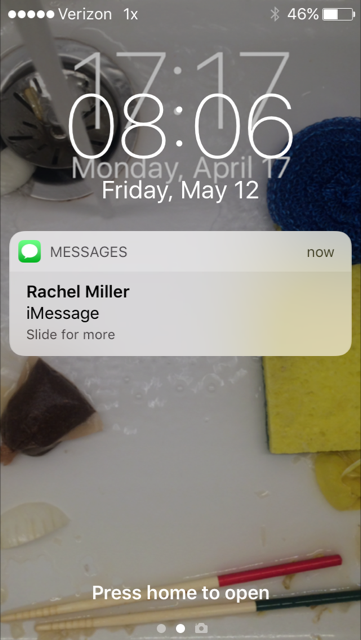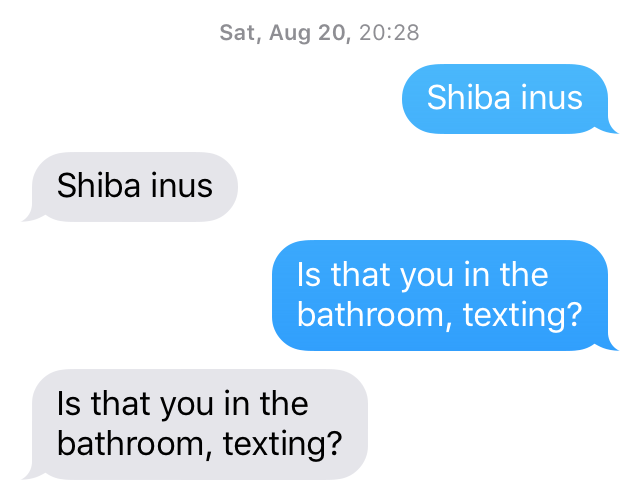The Joys of Texting Myself
It’s very satisfying.

My friend Nicole keeps track of her favorite public bathrooms by texting herself. Genius, I thought. Convenient, simple, obvious! Delightfully self-reflexive! That was the first I ever heard of texting yourself, and I felt like I’d been let in on a big secret, maybe even the ultimate Hack, but without the binder clips and toilet paper tubes appearing where they don’t belong.
The best self-texting scenarios seem practical at first: Why not use a thing you already open five thousand times a day to quick-jot notes and reminders? It’s like having a notebook in your pocket, minus the pen, and even less complicated than Notes. The process is simple. But like most simple things, it’s deceptively straightforward, and the real benefits only surface after a few rounds.
Here’s how it works.
Get an iPhone. Open up a new text, type your number in the To: field, then text yourself. Say anything. The first thing I wrote myself, a few months after learning about this technique was “Alley cat vintage anacortes” because I promised a lady in Anacortes, Washington I’d call back about a dress (I didn’t call back).
In response to your text, a bubble with the same message appears: “Hi, Hi.” It takes a solid beat or two on the iPhone, but it always appears. It’s a very satisfying process.

It’s possible to communicate with yourself on other devices and platforms, but none feel rewarding in quite the same way. Most androids allow for self-texting, but the response appears instantaneously, extinguishing a bit of the magic. WhatsApp is the purgatory of self-texting: it allows you to text yourself, but there’s no response, just the weird specter of you, typing… which lasts way beyond the time you’re actually tip-tapping. The phone app for gchat allows you to find yourself, but then says “couldn’t create conversation” and marks your attempt with a scary red-circled exclamation point, as if you’ve transgressed. The email-bound version of gchat won’t even let you attempt a conversation. Slack, on the other hand, encourages self-chat as a way to organize documents and notes — probably because it was borne of email, where people are more used to sending documents and reminders to themselves. That’s about practicality, I think, and most people who text themselves consider it a practical act, not a joyful or a personal one.
A small but very scientific survey shows that about two percent of the people I talked to last week text themselves, and zero percent do it regularly.
After I asked, two friends tried it for the first time ever. Sara Beth texted herself “Remember to bring home all Deb’s presents. Outfit for Saturday & comfy clothes.” She emailed me the screenshot. I love Deb, I responded. Tell her HBD. Will Sara Beth continue texting herself? Unlikely. In fact, she’s more likely to text a friend the same info and request a reminder, she claimed, adding #thisisthirty.
Ben, sitting next to me at a bar, wrote “Remember never to hang out with Rachel and Brian ever again,” and was freaked out by seeing his own name appear. I said, But isn’t it great?! and tried to describe how seeing yourself doubled can actually be freeing, how the initial repulsive recognition can give way to a surprising sense of comfort. He disagreed, and says he plans to stick with emailing himself.
Two friends had used it in the recent past, but probably won’t anymore. My friend Ellen self-texted several times when she was dating. “Test” she’d text, to make sure her phone was indeed operable and open to signals. Seeing “Test” repeated back must have been infuriating, but it’s hard not to admire the way Ellen recognized an opportunity and wasn’t scared to face herself, or her worst nightmares.
Chris responded to my question with surprise, saying, Yes! Just last night. He followed up with a screenshot (“Whiplash, Whiplash, Huh, Huh”) and told me he was marvelling at how weird it looks. He described it as synthetic and slightly eerie, a glitchy aesthetic but without the glitch. Like vaporwave, he said, and sent me a song called “Andro” by Oneohtrix Point Never that was truly freaky, partly because it’s from an album called Replica, but doubly freaky because there’s a chatbot, also called Replika, that was originally designed to recreate conversations with a dead friend.
There are thousands of color-coded, supportive, alert-filled organizational apps designed to dance circles around a simple text. A text can’t really be organized or remind you of something if you don’t go looking for it, but that’s the best part. It’s weirdly rewarding to use a complicated instrument for simple things, as if debasing its intelligence will somehow confirm your own, or at least delay the inevitable judgement: your TI-89 calculator is smarter than you, but at least you can draw boobs with it while you come to terms with reality.
The simplicity of the whole operation — like in gives like out — seems to magnify the value of texting yourself. Plus, it feels like a dark back-channel convo, a tricky diary that no one reads except Verizon or AT&T, or your nosy partner. No rules.
I texted myself a full dream the other day, and no one stared blankly at me or texted back “That’s weird.” When the dream repeated itself to me in butterflied fragments, it actually sounded better, because I am in fact the best audience for my dreams. “The waves were white and deep blue, The waves were white and deep blue, I never went in the water, I never went in the water.”
I’ve also used the self-texting mechanism to hold a full conversation with someone else, sitting right next to them. This amplified the sense of self-confirmation into a drone-shaped therapy session: “My babe, My babe, You are so wrong about your hair, You are so wrong about your hair, It’s beautiful, It’s beautiful, I love you, I love you.”
Later that night, in the bathroom by myself, I texted “I’m dying,” and it came back coldly comforting, like a pat on the shoulder. “I’m dying.”

Long before all this, back in the first few months of self-texting, I was pleasantly drunk and wanted to remember the name of the internet dog, so I texted myself “Shiba Inu.” The response appeared, reliably. I had the same reaction as Chris’ “huh,” which is kind of like the unstoppable desire to say “echo” into the void (suddenly I understand Amazon) but I wanted a bigger twist, so I wrote “Is that you in the bathroom, texting?”
Drunk timing made the waiting beats last even longer, and I sat frozen, alert for a confirmation that I existed. It came. “Is that you in the bathroom, texting?”
“Yep, it’s me, Yep, it’s me.”
Rachel Miller lives in Ridgewood and used to collect stamps.
